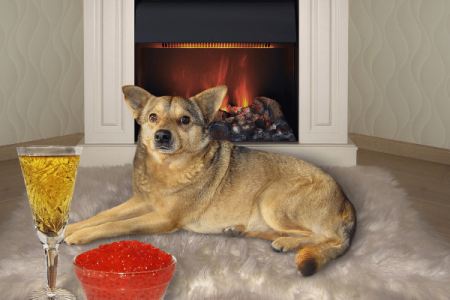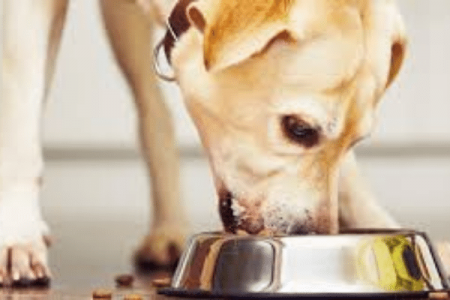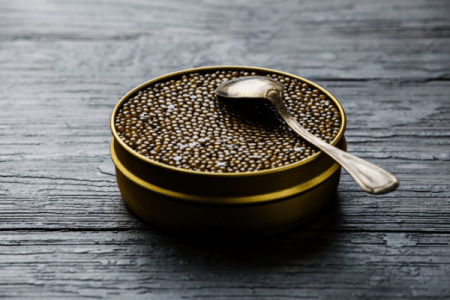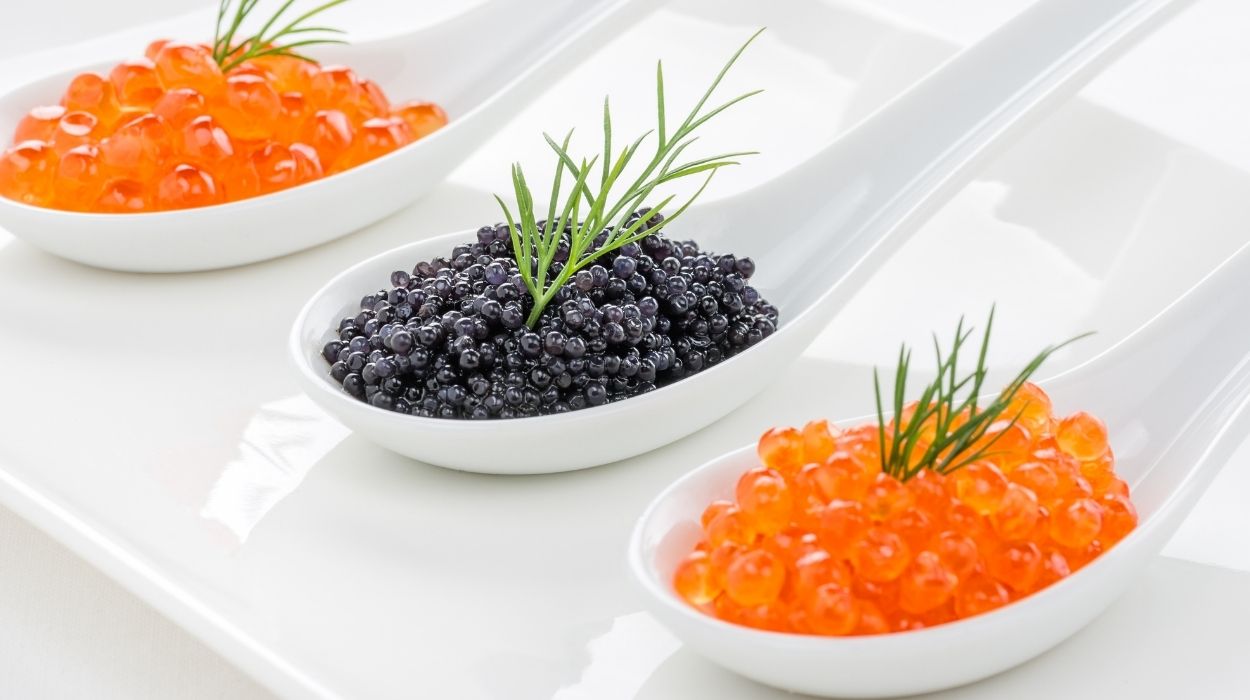Do you know that caviar is one of the most expensive food items across the world? The history of caviar goes back to the 1240s during the rule of Genghis Khan’s grandson Batu Khan!
Caviar’s delicious taste and premium texture give our taste palette a divine experience. You might’ve wondered if you can share caviar with your pooch.
If yes, then you are looking for an answer to whether caviar is safe for your dog or not. This article also covers the risks and benefits of feeding caviar to your dogs.
Is Caviar Safe For Your Dog’s Consumption?

The short answer is ‘Yes’. Feeding caviar to your pup in moderation will help. However, it contains salts in high amounts which can be problematic.
Caviar is beneficial for your dog’s metabolism and immune system. It is a rich source of vitamins and minerals that helps foster the growth of a healthy nervous system.
Still, you must be wary of your dog consuming caviar in large quantities. It can result in overweight, dehydration, and other severe health conditions.
What Are The Side Effects Of Caviar In Dogs?

Immoderate consumption of caviar can cause the following side effects in your dog:
1. High Sodium Content
Caviar has loads of sodium! In simple terms, one tablespoon of caviar contains nearly 240 mg of salt. And as a matter of fact, even a 30-pound pooch must not consume more than 100 mg of sodium in a day.
Thus, even a single tablespoon of caviar can lead to salt in smaller dogs. Symptoms of salt poisoning in dogs include:
-
Diarrhea
Vomiting
Drooling
Tremors
Loss of coordination
Seizures
Salt poisoning is a serious medical emergency in dogs and should be examined by the vet immediately.
2. Excessive Calorific Value
Adult dogs need around 25-40 calories per pound of their body weight. And can you guess how many calories does one tablespoon of caviar contain? A massive 42 calories! This is approximately 16 grams.
Your pooch is already gaining enough calories from his regular diet. Therefore, adding caviar into the diet can lead to weight gain in dogs.
Moreover, obesity further increases your pup’s risk of getting diseases like diabetes, arthritis, and other cardiac problems.
3. Risks of Food Poisoning
Caviar might not be as premium as it sounds. Do you know that caviar can trigger food poisoning in dogs if it is not properly manufactured, processed, collected, stored, and handled?
Such units of caviar are most likely to be infected with harmful bacteria and pathogens such as Salmonella and Clostridium botulinum. Food poisoning in dogs can cause various symptoms like:
-
Abdominal pain
Loss of appetite
Diarrhea
Fever
Dehydration
Vomiting
Lethargy
Warning: Over-feeding caviar to your dog can lead to high cholesterol and sodium levels in his body.
What Are The Benefits Of Caviar In Dogs?

While it has several risks if over consumed, caviar also has a number of health benefits for dogs if eaten in moderate amounts:
1. Strong Immunity
Caviar is a powerhouse of Omega-3 fatty acid that assists the dog’s immune system in improving the production of ‘B cells’ production.
These blood cells produce antibodies in your dog to help him ward off viruses, infections, and other common diseases faced by dogs.
2. Strong Bones and Joints
Caviar is an abundant source of vitamin D that is the lifeline for healthy bones, joints, and teeth. It also contains collagen, an enzyme that improves dog’s bone and skin health.
Due to its anti-inflammatory nature, collagen is beneficial for dogs suffering from arthritis and upset bowel movements.
3. Strong Eye Health
Caviar also contains long-chain Omega-3 fatty acids like EPA (eicosapentaenoic acid) and DHA (docosahexaenoic acid).
Both EPA and DHA are super beneficial for your dog’s vision and eye health. They help dogs reduce dry eye syndrome, age-related macular degeneration (AMD), and diabetic retinopathy risks.
What Amount Of Caviar Is Suitable For Your Dog?
An average 30-pound dog must not consume more than 100 milligrams of salt in a day.
You must feed him caviar only as a rare treat and not an occasional meal. Thus, it would help if you served caviar to your pooch only once or twice a week.
Moreover, the suitable amount of caviar depends on your dog’s pedigree, age, weight, and height. Therefore, it would be best to consult your vet while thinking about adding caviar to your dog’s diet.
Author’s Note: Instead of its sturgeon variant, you should give your dog low-salt caviar, for instance, Trout Caviar.
FAQs
Q. What are the alternatives to caviar for dogs?
Other than low-salt variants of caviar, you can feed him different varieties of fish like tuna, salmon, and shrimp.
Q. What should you do if your dog eats caviar?
You must stay calm and figure out how much caviar your dog consumed. If you are not able to do so, you must go to the vet for his examination.
But you do not have to panic if your pooch has licked 1-2 teaspoons of it. Just monitor him for the next few days and check for any adverse reactions.
Conclusion
As dog owners, you must remember that pets such as our furry dogs prefer meat over anything. You might want to feed your pooch some generous amounts of caviar unabashedly, but that would do more harm to him than good.
With caviar, moderation is the key. You do not want your dog to suffer from sodium poisoning or bacterial contamination.
If you are seriously looking for foods rich in Omega-3 fatty acids, there are plenty of other options than caviar.
Your dog might love caviar but do not let it become his habit. You have to make a mental note of not buying the kinds of caviar that are not considered safe for dogs.
By now, we believe you must have figured out whether you should give caviar to your four-legged canine companion or not.
Did the information in this article help you? Do you want to share your dog’s experience when he licked a spoon of caviar for the first time? Share your stories, suggestions, and queries in the comment section below!

Dr. Aram Baker has been with Santa Clarita Animal Hospital since 1995 and his special interests include behaviour medicine and dermatology. He graduated from the Cleveland Humanities Magnet Program in Reseda, CA and attended California State University at Northridge where he received a Bachelor’s degree in biology. He went on to pursue his Doctorate in Veterinary Medicine at the University of California at Davis. He also spent time in the zoological medicine department at U.C. Davis during his Junior and Senior years. He is dedicated to caring for all pets big or small, young or old with compassion, patience, kindness, and love.
